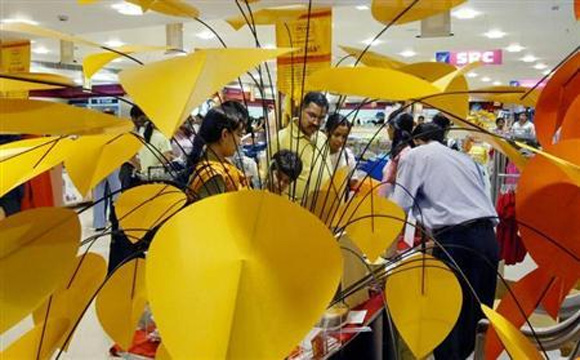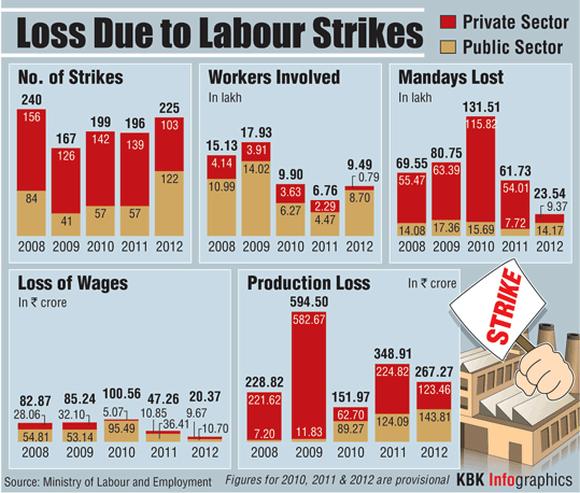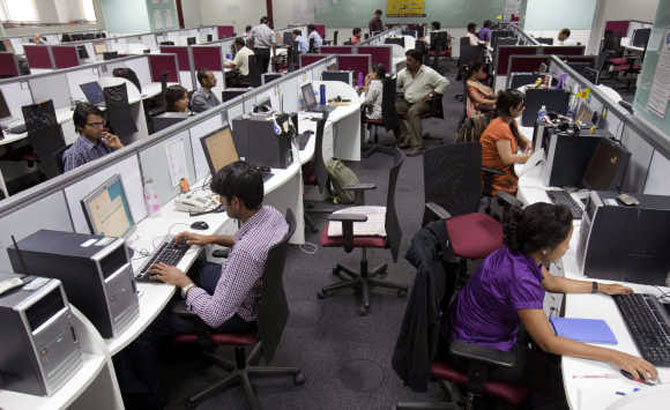Photographs: Reuters Samiran Sarangi in New Delhi
The Labour and Employment Ministry remained engaged with wages and unemployment issues during 2013 which also saw a nationwide trade union strike and the death of minister Sis Ram Ola.
The death of Ola on December 15 came at a time when the Ministry was looking to take forward various social issues such as bringing a national policy for domestic workers and the much needed amendments in the age-old labour related laws.
He had taken charge of the ministry on June 17 after the then Minister Mallikarjun Kharge was shifted to the Railway Ministry.
The country came to a virtual stand-still when trade unions called a two-day general strike on February 20 pressing for implementation of their 10-point charter of demands.
. . .
Wages, unemployment issues kept Labour Ministry busy in 2013
Photographs: Reuters
The strike was called by 11 central unions to demand urgent steps to control price rise, strict enforcement of labour laws in all places of work, social security net for workers in the unorganised sector, end to disinvestment in PSUs and raising minimum wage to Rs 10,000.
The industry calculated a loss of Rs 25,000 crore (Rs 250 billion) to the economy.
A GoM was set up by the Prime Minister to look into the demands of the unions but the leaders contended that the GoM was not serious to address their issues.
The GoM comprises Defence Minister A K Antony, Finance Minister P Chidambaram, Agriculture Minister Sharad Pawar and Labour and Employment Minister Mallikarjun Kharge and has met couple of times only since it was constituted.
In May, the Indian Labour Conference met here pushing for sops to working class such as a minimum assured pension of Rs 1,000 per month, universal social security coverage and enactment of a legislation on right to work on the lines of right to information and right to education.
. . .
Wages, unemployment issues kept Labour Ministry busy in 2013
The conference also recommended minimum wages for workers employed in central government schemes such as anganwadi, midday meal and Asha and recognising them as 'workers' instead of voluntary workers.
Earlier during the year gone by, the government cleared a proposal to make the minimum wages announced by the Centre for workers in unorganised sector statutory for all states so as to bring parity in wages paid.
At present the national floor level minimum wage is Rs 115 per day but since it is not binding on state governments and employers, the Centre merely advises the states to raise the wages so that they are on par with the national floor level.
The decision of the Cabinet cleared the way for bringing in amendment to the Minimum Wages Act, 1948 for incorporating the statutory provision.
. . .
Wages, unemployment issues kept Labour Ministry busy in 2013
Photographs: Reuters
A national policy for domestic workers which gives them the right over minimum wages, paid leave and regulated working hours also came up for consideration of the government.
Towards the end of 2013, the Labour Ministry came out with a study which said that with an increase in education levels in the country, the unemployment rate was also increasing across age groups.
It said that one out of every three persons in the age group 15 to 29 years who have completed at least their graduation has been found to be unemployed in the report on 'Youth employment-unemployment scenario.
According to the report, unemployment rate among the persons who cannot read and write any languages or are considered illiterate was the lowest with 3.7 per cent without work in the 15-29 age group.
The image is used for representational purpose only
. . .
Wages, unemployment issues kept Labour Ministry busy in 2013
Photographs: Reuters
Pushing ahead with its skills development initiative, the government cleared the National Skills Qualifications Framework on December 19 which offers vocational qualifications according to levels of learning, skills and aptitude.
The hallmark of the programme would be that the credit accumulation and transfer system will be integrated in the NSQF, enabling the candidates to move between education, vocational training and work at different stages in their lives according to their needs and convenience.
While the target is to train 500 million skilled workforce by 2022, the Union Budget of 2013 also proposed a programme under which acquiring necessary skills will not only help a candidate gain employment but also fetch Rs 10,000 as a monetary reward on passing the training programmes formulated by National Skill Development Corporation.






article